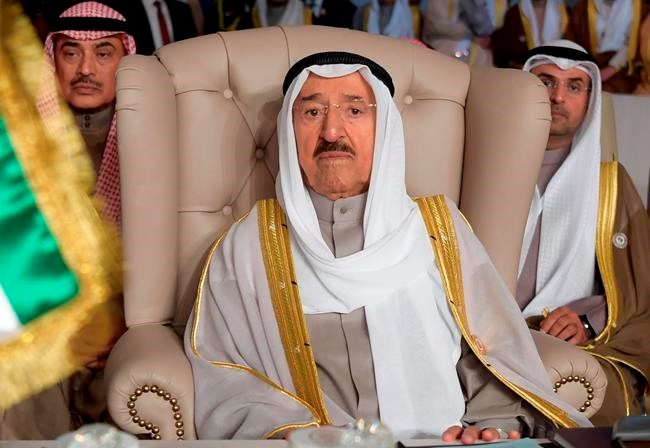DUBAI, United Arab Emirates — Kuwait's 91-year-old ruling emir left Thursday morning for the United States to seek further medical care after recently undergoing surgery, its state-run news agency reported.
Kuwait has yet to elaborate on what required Sheikh Sabah Al Ahmad Al Sabah to seek a previously unannounced medical treatment beginning Saturday and a surgery Sunday. However, Sheikh Sabah’s sudden surgery could inspire a renewed power struggle within Kuwait’s ruling family.
The state-run KUNA news agency quoted a statement from the country's royal court saying Sheikh Sabah left “based on advice from the medical team treating His Highness to complete his treatment after a successful surgical procedure."
“We ask the Almighty to aid his recovery and sustain His Highness, who is healthy and well taken care of, and to protect him from all harm,” the statement said.
A statement attributed to Sheikh Ali Jarrah Al Sabah, the country's royal court minister, did not elaborate or say where in the U.S. Sheikh Sabah will receive treatment.
However, an Airbus A340 flown by Kuwait's government left Thursday morning flying west. That same Airbus had flown to Rochester, Minnesota, and New York City before returning to Kuwait just days before Sheikh Sabah's surgery. That Airbus A340 is believed to be a medical transport aircraft.
Rochester is home to the flagship campus of the Mayo Clinic, one of America's best hospitals, and has treated Sheikh Sabah in the past. The Mayo Clinic did not respond to a request for comment early Thursday.
Kuwait earlier announced that 83-year-old Crown Prince Nawaf Al Ahmad Al Sabah had assumed some of Sheikh Sabah’s powers temporarily, without explaining why that was necessary.
A copy of the ministerial decree posted by Kuwait’s official gazette, Kuwait Al-Youm, and seen by The Associated Press on Sunday, said the crown prince would be empowered for “the duration of a surgical procedure until the health event is over.”
The decree did not elaborate. Kuwait’s Information Ministry has not responded to requests for comment.
Sheikh Sabah, a widely beloved ruler in this OPEC-member nation, took power in 2006 just nine days into the rule of the ailing Sheikh Saad Al Abdullah Al Sabah. Concerns mounted during Sheikh Saad’s brief reign as he was seen in public only in a wheelchair and did not speak.
However, Sheikh Sabah’s ascension upset an informal power-sharing arrangement between branches of Kuwait’s ruling family. While Kuwait has since remained politically stable with the most-empowered parliament of any Gulf Arab nation, there have been internal power struggles behind the scenes of his rule.
Kuwait, a nation home to 4.1 million people that’s slightly smaller than the U.S. state of New Jersey, has the world’s sixth-largest known oil reserves.
It has been a staunch U.S. ally since the 1991 Gulf War expelled the occupying Iraqi forces of Saddam Hussein. Today, Kuwait hosts some 13,500 American troops, many at Camp Arifjan south of Kuwait City, which is also home to the forward command of U.S. Army Central.
Sheikh Sabah, a longtime foreign minister for Kuwait, has drawn praise during his rule for hosting donation drives for both war-torn Iraq and Syria. He also has been the lead negotiator in trying to resolve a yearslong boycott of Qatar by four Arab nations over a political dispute.
He previously cancelled a White House visit last November while in the U.S. and visited a hospital there for medical checks.
Jon Gambrell, The Associated Press



